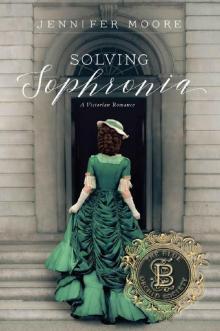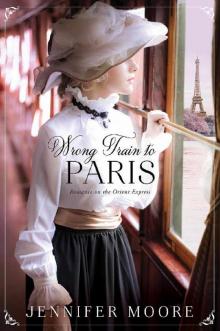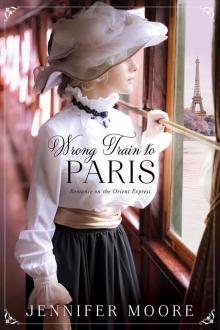- Home
- Jennifer Moore
Simply Anna
Simply Anna Read online
Cover image: Jamaica Kingston Devon House by Eye Ubiquitous; Robert Harding. Reference Photography: Figure photography by McKenzie Deakins, http://mckenziedeakins.com.
Cover design copyright © 2015 by Covenant Communications, Inc.
Published by Covenant Communications, Inc.
American Fork, Utah
Copyright © 2015 by Jennifer Moore
All rights reserved. No part of this book may be reproduced in any format or in any medium without the written permission of the publisher, Covenant Communications, Inc., P.O. Box 416, American Fork, UT 84003. The views expressed within this work are the sole responsibility of the author and do not necessarily reflect the position of Covenant Communications, Inc., or any other entity.
This is a work of fiction. The characters, names, incidents, places, and dialogue are either products of the author’s imagination, and are not to be construed as real, or are used fictitiously.
First Printing: September 2015
To Marmé and Par
For all the late nights teaching me to sew,
Wendy’s picnics at our special place in the park,
And slipping me wilds when we play UNO.
Acknowledgments
I am so very grateful to all who make it possible for me to follow my dreams.
My husband and sons support me every day, understanding when I forget to make dinner or need to rearrange their schedules to fit with mine. They are the foundation of all that I do, cheering me when I’m down and cheering for me when things are great.
The writerly friends who have taken me into their fold, offering a shoulder to cry on or a brilliant bit of advice. I could never do it without all of you: Josi, Nancy, Becki, Ronda, Jody, Marion, Jeanette, Christy, Margot, Ken, Cory, Chris, The Bear Lake Monsters, and Carla. Your encouragement means the world to me.
Jolene Perry, Margot Hovley, Lisa Schwebach, Mandy Kimball, and Melissa Fugazza, thanks for reading this when it was the roughest of rough drafts. Your input is a treasure.
And the team at Covenant. I am so lucky to work with you. Stacey Owen is the world’s best editor. Stephanie Lacy’s a marketing whiz, and Christina Marcano designs the most beautiful covers. Kathy Gordon, Robbie Nichols, and so many others work behind the scenes to make me look good. My name is the only one that ends up on the cover, but all of you deserve to be right there too.
You all bless my life on a professional as well as a personal level in ways you don’t even realize. Thank you, thank you, thank you.
Prologue
Anna Wheeler paused, clutching the doorframe as the boat pitched. Once the vessel righted itself, she smoothed down her skirts and entered the ship’s dining room. She curtsied, even though only one of the four adults noticed her.
Amelia—Lady Lockwood, Anna’s mistress—caught her eye and smiled briefly before turning her attention back to the others seated at the dining table. The small table seemed abnormally large in the cramped space.
Anna pressed her book to her chest as she walked around the edge of the room as close to the wall as possible. If life had placed her in another role, would she still make it her habit to blend into the background? Would she be the center of attention—causing people to laugh, engaging in interesting conversation? There was so much she wanted to say, so many observations she wanted to share . . . But it was insensible to indulge in fantasies. She was not a member of high society.
She was simply Anna.
Her occupation relegated her to the position of bystander. She felt as though she was permanently on the outside looking in, watching others live their lives. A lady’s maid must be content to observe, she reminded herself.
Anna had worked for Lady Lockwood since Amelia had rescued her from a cruel employer three years earlier. She’d been very fortunate to enjoy her new employer and situation, bidding farewell to her chambermaid uniform and dressing in Amelia’s older gowns as she accompanied her mistress on errands and helped with her wardrobe. Although the countess hardly needed a lady’s maid at sea, Amelia wouldn’t hear of leaving her behind when they embarked on this voyage.
Lord and Lady Lockwood were the owners of the ship, captained by Sidney Fletcher, who was married to the earl’s sister. Sidney also sat at the table with his wife, Emma, and their adopted five-year-old son, Nico.
Once she had overcome her initial bout of seasickness, Anna had assumed the role of a nanny aboard the ship, caring for Nico and Lady Lockwood’s infant daughter, Lottie. Sidney and Emma had discovered Nico in Spain after his parents were killed by French soldiers. She’d rarely seen more loving parents. But Nico was a five-year-old possessing all the curiosity and recklessness of a young boy, and Anna had to watch him constantly on the ship.
In the first week of their voyage, a man had fallen from the rigging into the water, and though the crew had immediately reefed the sails and sent a lifeboat to search for him, they’d found nothing. After that, Anna refused to allow herself to be lulled into a false sense of safety, especially where Nico was concerned.
Anna walked to the cabinet on the wall, but before she opened it, the captain stood and rounded the wooden table to approach her. Anna dipped in a curtsy, an action she continued to perform in spite of the captain’s assurance that such courtesy was not necessary on the voyage. “Is there something I can do for you, sir?”
“Quite the contrary, Anna. I’d hoped to thank you for your brilliant idea of rigging the canvas over one of the dinghies to create a play area for Nico. Who would have thought a small boy’s imagination could make a lifeboat into a pirate ship?” The captain smiled affectionately as he spoke about the boy. “A six-week voyage is tedious for a child, and I cannot recall my son being happier—nor so well behaved. Though I do wish you had come to me with the suggestion instead of persuading my wife to act as though the idea were her own.” He raised his brows kindly to show that he was not reprimanding her.
Anna glanced toward Lady Emma and then lowered her face. “I did not think it my place, sir, to advise a captain on the management of his ship.”
He shook his head, opening his arms as he spoke. “Nonsense, in this case it is the management of a child. I fear it is my tendency to assign duties instead of remembering what it is to be a young boy. I appreciate any such help, especially while my wife is . . . in her present state.”
Anna blushed at the mention of Lady Emma’s delicate condition. If all went well, when the family sailed home to England after Christmas, they would have a new member.
The ship pitched, and Anna grabbed the back of a chair for support. The brass lanterns on the ceiling swayed, their pools of light moving back and forth across the room. The waves had grown rougher, even in the smooth water of the Caribbean. She had overheard the captain mention to the earl that afternoon that they were likely in for a tropical squall.
“Mrs. Fletcher indicated that the particular choice of companion for Nico was your idea as well—Mr. Harvey,” Captain Fletcher continued, clasping his hands behind his back. “I admit I’d have never considered him for such a position.”
Anna glanced up at him and looked down at her hands. “He seemed a gentle sort of person. Mr. Harvey mentioned once that he had a son near to Nico’s age.” She gripped the chair harder as the deck rolled. She hoped the captain didn’t intend to scold her for such a bold suggestion. “I believe he has been despondent, possibly pining for his family. I only thought when I am occupied with helping the women or tending to the baby . . .”
“The pairing has been perfect.” The captain leaned to the side, without seeming to notice, as the deck tipped. “Mr. Harvey has seemed in better spirits, his performance has improved, and Nico has taken on an air of calm as he’s spent time with such a subdued man. You are an excellent judge of character, Anna,
a talent I’m afraid is too often for naught in your profession.” The captain spoke lightly, his smile broad, and Anna wondered if he was teasing her. One could never be quite sure with Captain Sidney Fletcher.
Sidney inclined his head slightly. “But I have disturbed your solitary time, and I know how precious such a thing is aboard a small ship.”
“I have come to put the book away and fetch Nico for bed.” Anna reached to unlatch the cabinet of the bookcase, but the ship pitched again, and the book fell from her hands.
It hit the deck, and Captain Fletcher scooped it up. “Edward Long’s History of Jamaica. Third volume.” He raised he brows and tipped his head to the side. “You have no doubt completed the other two.”
Anna nodded and held onto the chair with both hands. She’d thought learning about the island would help dispel some of her anxiety when it came to traveling to such an exotic locale. “Yes, sir, and I hope to finish this last one before we arrive.”
He opened the cabinet and slid the book next to the others. “I estimate you have a day, perhaps two. Though I predict we will spot the island before midday tomorrow.”
“And will it take so long to arrive once the island is in sight, Captain?”
“The current will bring us to the windward side of the island, but as there is no harbor on the north shore, it will take another half day to reach Kingston on the leeward side.”
Anna nodded. Although she’d heard the crew telling each other they were near to their journey’s end, she’d not realized it could be her last night aboard.
“But you have no doubt learned all about the favorable trade winds in the Caribbean and Columbus’s disastrous landing on the north shore in your exhaustive study.” Sidney pointed to the bookshelf.
“Yes, sir, though I admit, I was far more interested in the tales of pirates and bands of escaped slaves.” She fingered the pendant on her necklace and glanced up at him. “Are we in much danger from such men?” Anna felt a mixture of nervousness and excitement as she’d read the stories of the untamed Caribbean. She’d never expected to travel the world.
“I find myself more concerned about the French.” Sidney lifted a shoulder. “We’re still at war, after all. However, I assure you, this ship can outrun anything Napoleon should send after us. As for buccaneers, and Maroons—”
“Any of the three groups are equally likely to hold us for ransom and deliver us for a handsome profit,” Amelia said as she joined them.
Anna curtsied, and Captain Fletcher inclined his head toward the countess.
Amelia pointed toward the books. “Even the buccaneers, or the Brethren as they prefer to be called, have become sadly practical.” Her eyes sparkled as they usually did when she spoke of her island home and the oddities that awaited them there. “They do enjoy their reputation as bloodthirsty villains and foster it carefully, as it is to their advantage to be feared. But the truth is they are businessmen seeking a living. Not that their methods are honest by any means. They live by their own rules, bound to one another by oaths. Most islanders consider them more of an annoyance to be tolerated than anything, though it would not be wise to cross them.”
Anna had a hundred questions on the tip of her tongue, but she knew her place and instead closed her mouth and smiled politely, hoping Amelia would expound on the topic without prodding. She wondered how Amelia could remain so cheerful while she spoke of murderous outlaws. “It sounds very . . . interesting, my lady.”
“And you shall love Jamaica.” Amelia clasped Anna’s hand in her excitement. “The warm air, the flowers in the trees, the colorful birds. It is like no place on earth. I cannot wait for all of you to see the plantation. William and Sidney, of course, have seen it already.” She turned toward her husband.
He nodded from his chair, where he held their sleeping infant in his arms.
The ship tipped, and the three of them shifted their positions to maintain their balance.
Emma approached and slid her hand in the crook of her husband’s elbow. “Good evening, Anna.” She rested her other hand on her round belly.
“Lady Emma.” Anna dipped again. “Is Nico ready to retire?”
Emma smiled and looked back at her curly haired son. “He and I have quite different opinions on the matter.” She motioned for Nico to join them.
But the boy shook his head. He folded his arms and scooted farther back into his chair.
Sidney sighed and raised his eyes to the heavens.
Anna approached Nico and knelt so they were at eye level. She set her hands on the arms of the chair and leaned toward him as if to share a confidence. “Nico, the captain tells me we shall be able to see Jamaica tomorrow morning. How will you be the first to cry ‘Land ho!’ if you are too tired to awaken early?”
Nico looked from Anna to his father.
Sidney nodded. “It is true, Nico. I wondered if you might be responsible for the management of my spyglass. I need a crew member with excellent eyesight.”
“Tengo—”
“In English,” Sidney reminded him.
“I have very good eyesight,” Nico said. He opened his eyes wide as if to illustrate his point.
“You may be the perfect man for the job,” Anna told him. “But if you do not get enough rest . . .”
Nico slid off the chair and took Anna’s hand, pulling her toward the door. “Come, Anna. It is time for sleep.”
Lady Emma and Anna exchanged a smile. Sidney and Emma kissed their son and bid him goodnight.
Anna glanced at Amelia and Lord Lockwood whispering together and admiring their beautiful daughter, Lottie. The familiar pang of loneliness swelled in Anna’s chest. She touched the pendant at her neck. How she wished she had a family of her own, someone to kiss her good night. She brushed the thought away. It would do no good to dwell upon what could not be. A lady’s maid was not destined to become a wife or a mother. She was bound to the family she served.
There was a time when her life had run a different course. If only things hadn’t changed, she would have been presented at court, danced with handsome gentlemen, maybe even had a husband and a baby of her own by now. But the sudden deaths of her parents had ended Anna’s dreams for her future. She was fortunate to have a position with a kind family and would do well to remember it.
Nico clasped Anna’s hand again. Anna closed the door behind them, unfastened a lantern from the wall, then led him down the narrow passageway to the quarters they shared.
She helped Nico change into his nightclothes and told him a story, watching his eyes grow heavy. She lowered her voice, convinced he was nearly asleep when he sat up in the berth.
“Anna, mi espada.”
“Your sword?”
“I cannot go to sleep without mi espada.” Nico began to cry.
Anna knew from experience that he would only become more agitated if his toy was not found, and it would be virtually impossible to convince him to sleep at all. She brushed his curls off his forehead, laying him back down. “Do you remember where you left it?”
“Sí. In the pirate ship.”
She remembered precisely where Nico had placed the toy sword in the lifeboat when they’d been called to supper. “Then I shall fetch it,” she said. “But only if you stay in your berth and close your eyes.”
“Gracias, Anna,” Nico said in a sleepy voice.
Anna lifted the lantern and stood. The choppy waves had not calmed, but if she did not hurry, they would only become rougher. She stepped into the hall and hesitated, glancing to where the light still shone beneath the dining room door. Then she hurried to the companionway at the other end.
Anna ran a finger over the pendant on her necklace as she did whenever she needed confidence. It had been eight years since her parents died of measles. The necklace, a gold disc engraved with her name, had been a christening gift. It was all she had to remember them by. Not all. She chided herself. She had memories of their laughter and smiles, an assurance that they loved her. That was more than most cou
ld claim.
Focusing her mind on the task at hand, Anna held onto the rails and climbed the steps of the companionway, ignoring the creaking of the ship as it rocked on the building waves. Raindrops pattered on the sails and decks.
The deck tilted, and she held onto the railing to wait as the ship righted itself. She stepped from beneath the overhang, wishing she had a cloak to pull over her head against the rain.
The lifeboats were stored above the deckhouse. Mr. Harvey had fashioned a rope ladder that could be rolled up and stored with the dinghy to keep the deck clear. Nico was much quicker than Anna at scaling the ladder, but over the past few days, she’d joined him in his private “pirate ship” often enough that she knew she could make quick work of climbing up and fetching the boy’s missing sword, even encumbered with the lantern.
She reached with one arm to release the ladder from its coil. The wind blew it from her grasp, and she clutched the gunwale railing to keep her balance. She gasped at the cold as a spray of seawater soaked her. Little streams of water flowed over her face and dripped down her back. Luckily the flame remained lit.
Since there was nowhere to set the lantern, she continued to hold it with one hand and released her grasp on the rail to catch the flapping rope ladder. Once she had a firm grip and placed her foot on the bottom rung, it would be only a matter of working her way up to the deck. The sails flapped noisily overhead, and the wind moaned. She looked upward at the blackness, grateful for the lantern. From this distance, the running lights at the stern were merely smudges. A wave of fear washed over her, and she started to question her decision to go after the sword. She hadn’t wanted to bother anyone, but now . . .
The ladder swayed, and she pressed herself against the ropes as tightly as she could. A strong gust pulled her hair from its fastenings, and for a moment she couldn’t see at all.
She shook the soaked curls out of her face. Irritation began to replace fear. This circumstance was of her own making. She’d been foolish to go above decks in a storm when she could have simply told Captain Fletcher or another crew member where to find the toy. She was ridiculous to think she was the person to retrieve it. Why could she not simply follow directions? Why did she feel it her duty to solve every problem? Her need to delve into matters that were beyond her and find a solution was her greatest shortcoming. She gritted her teeth. To turn back without the sword when she’d come this far was pointless.

 Charlotte's Promise
Charlotte's Promise Miss Leslie's Secret
Miss Leslie's Secret My Dearest Enemy
My Dearest Enemy A Week in Brighton (Timeless Regency Collection Book 13)
A Week in Brighton (Timeless Regency Collection Book 13) Solving Sophronia (The Blue Orchid Society, #1)
Solving Sophronia (The Blue Orchid Society, #1) Spring in Hyde Park
Spring in Hyde Park Emmeline
Emmeline Wrong Train to Paris (Romance on the Orient Express, #2)
Wrong Train to Paris (Romance on the Orient Express, #2) Wrong Train to Paris
Wrong Train to Paris Miss Burton Unmasks a Prince
Miss Burton Unmasks a Prince Safe Harbor
Safe Harbor The Sheik's Ruby
The Sheik's Ruby Change of Heart
Change of Heart Lady Helen Finds Her Song
Lady Helen Finds Her Song Simply Anna
Simply Anna